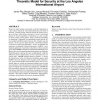87 search results - page 1 / 18 » Random Selection with an Adversarial Majority |
125
click to vote
CRYPTO
2006
Springer
15 years 6 months ago
2006
Springer
Abstract. We consider the problem of random selection, where p players follow a protocol to jointly select a random element of a universe of size n. However, some of the players ma...
123
click to vote
CORR
2011
Springer
14 years 9 months ago
2011
Springer
In this paper, we study the average case complexity of the Unique Games problem. We propose a natural semi-random model, in which a unique game instance is generated in several st...
121
click to vote
CRYPTO
2004
Springer
15 years 7 months ago
2004
Springer
We construct two efficient Identity Based Encryption (IBE) systems that are selective identity secure without the random oracle model. Selective identity secure IBE is a slightly w...
117
click to vote
ATAL
2008
Springer
15 years 4 months ago
2008
Springer
Security at major locations of economic or political importance is a key concern around the world, particularly given the threat of terrorism. Limited security resources prevent f...
126
click to vote
SCN
2008
Springer
15 years 2 months ago
2008
Springer
We present an implementation of the protocol of Lindell and Pinkas for secure two-party computation which is secure against malicious adversaries [13]. This is the first running sy...

